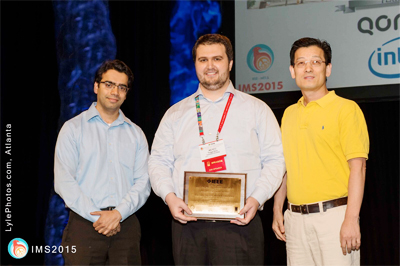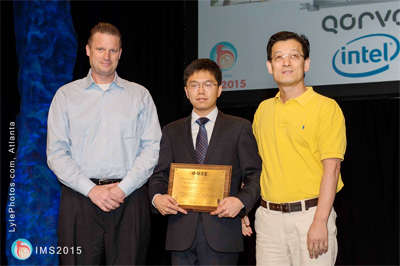Columbia Electrical Engineers Sweep Awards at IEEE’s RFIC
Tolga Dinc and Yang Xu, Electrical Engineering PhD students studying respectively under EE Professors Harish Krishnaswamy and Peter Kinget, won top honors at the 2015 IEEE Radio Frequency Integrated Circuits Symposium (RFIC), one of the most prominent conferences for the reporting of developments in the field of RF and millimeter-wave integrated circuits. Held in Phoenix May 17 through 19 and co-sponsored by the IEEE Electron Devices Society, IEEE Microwave Theory and Techniques Society, and IEEE Solid-State Circuits Society, the conference received some 210 paper submissions this year, 55% from students.

L-R: Assoc. Prof. Harish Krishnaswamy, PhD student Tolga Dinc, and UC-Riverside Prof. Albert Wang, TPC co-chair for 2015 IEEE RFIC.
“So Columbia’s EE students winning the top two Best Paper Awards is an extremely unusual and noteworthy accomplishment,” Krishnaswamy says.” There was quite a bit of buzz about it at the conference.”
Krishnaswamy’s student, Dinc won the “Best Student Paper Award - First Place” for his paper, "A 60GHz Same-Channel Full-Duplex CMOS Transceiver and Link Based on Reconfigurable Polarization-Based Antenna Cancellation." His paper describes a technique that enables a transceiver to transmit and receive at the same time and at the same frequency, potentially doubling wireless data capacity immediately. To accomplish this, the full-duplex receiver must perfectly cancel the echo of the transmitter, which can be nearly a billion times more powerful than the desired signal to be detected. Working with Krishnaswamy, Dinc has designed a novel system that uses polarization to cancel the signal within the antenna itself. Additional cancellation that is performed on the transceiver chip enables the transmitter echo to be suppressed to the extreme degree required. Another unique feature of Dinc’s chip and system is that while full-duplex radio-frequency systems are still in their infancy, the chip and system work at millimeter-wave frequencies (specifically 60GHz), 30x faster than current radio-frequency systems. Using his transceiver IC and system, Dinc has been able to demonstrate a full-duplex wireless link at approximately 1m distance (a typical range for millimeter-wave communication), making it the world’s first full-duplex wireless link using IC technology.

Prof. Peter Kinget and PhD student Yang Xu with Prof. Wang.
Kinget’s student, Xu, won the “Best Student Paper Award - Second Place” for the paper, "A Switched-Capacitor RF Front End with Embedded Programmable High Order Filtering and a +15dBm OB-B1dB." Xu’s research focuses on developing radio-frequency circuits that use only switches and capacitors, compared to traditional RF circuits that rely on active transistors that exhibit non-linear gain. By controlling the switches at a high speed with multiple non-overlapping clock signals, RF signals up to 700MHz can be filtered with this “passive” front end. A key advantage is that switches and capacitors are intrinsically linear and, as CMOS technology scales, faster clock speeds can be supported and higher speed RF signals can be processed. Large unwanted, interfering, blocking, or jamming radio signals can be removed from the antenna signal before it is sent to the baseband demodulator. This greatly enhances the overall linearity of the receiver. Xu’s receiver has an exceptionally large blocker rejection, including for blocking signals in very close proximity to the wanted signal. These features are key to transitioning wireless communication technologies to the next generation where they have to cope with progressively more and more interference due to the rapidly increasing spectrum usage.
“We are very proud of our students,” says Kinget. “There were only 19 Best Student Paper Award finalists for the first, second, and third place awards. As you can imagine, Columbia winning both the first and second place of the three best paper awards got noticed.”
